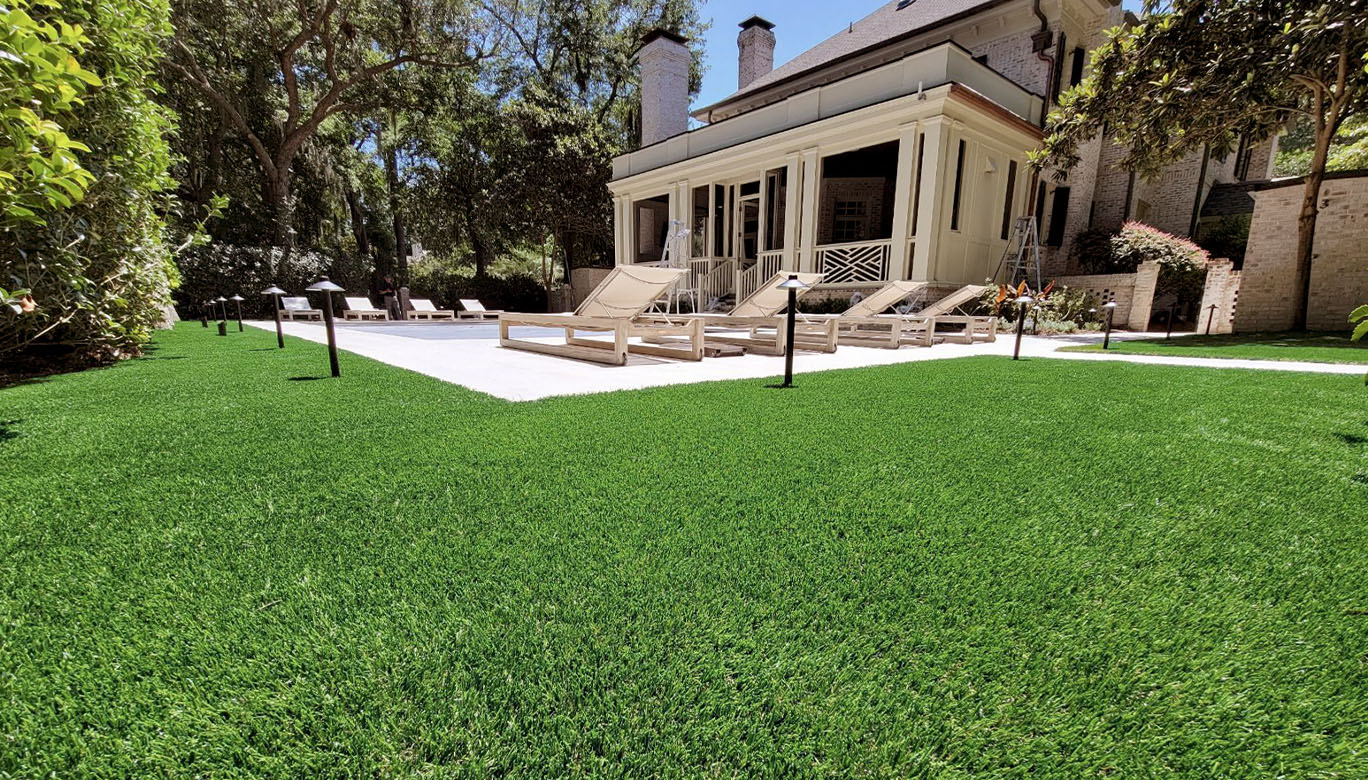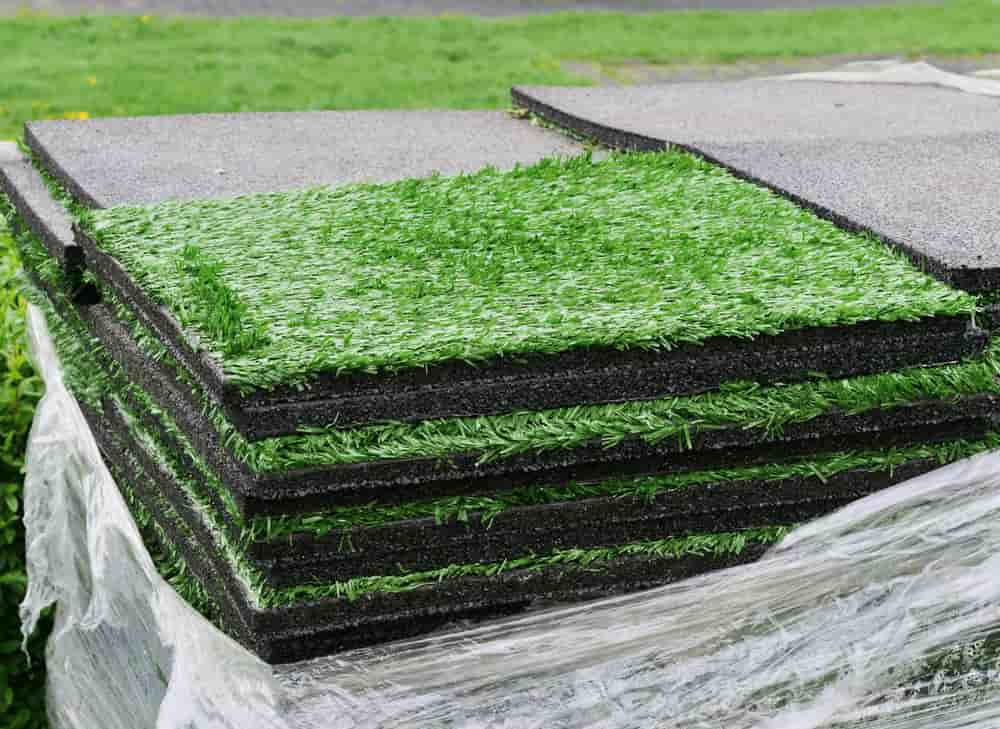Experience a Perfect Lawn with Arizona Artificial Turf for Any Outdoor Space
Experience a Perfect Lawn with Arizona Artificial Turf for Any Outdoor Space
Blog Article
Delve Into the Environmental Perks of Opting for Artificial Grass Solutions
The adoption of synthetic grass solutions presents a compelling chance to address pushing ecological obstacles. By significantly reducing water use and lessening the application of dangerous chemicals, these options not only advertise sustainable landscaping yet additionally safeguard neighborhood ecosystems. Moreover, the reduced carbon impact connected with lowered upkeep tasks contributes to an extra lasting approach to land monitoring. The implications of these benefits prolong beyond simple conservation initiatives, elevating inquiries about their long-lasting effect on environment conservation and general environmental equilibrium. Exploring these measurements exposes a complex interplay worth thinking about.
Water Preservation Advantages
One of the most substantial benefits of fabricated lawn is its capability to conserve water. In contrast, synthetic grass does not require watering, dramatically decreasing the general demand for water resources.
By getting rid of the requirement for routine watering, synthetic turf adds to lasting landscape practices and assists reduce the ecological influence of excessive water intake. The preservation of water extends to the decrease of overflow, which can lead to soil disintegration and waterway pollution.
Furthermore, the setup of synthetic grass permits homeowners and districts to assign water resources more successfully, concentrating on important usages such as alcohol consumption water and farming. The change in the direction of man-made grass not just advertises responsible water usage yet additionally lines up with more comprehensive environmental objectives focused on preserving natural sources.
As neighborhoods progressively prioritize sustainability, the water conservation benefits of synthetic turf provide a compelling instance for its fostering in commercial and property landscaping projects.
Lowered Chemical Use
The change to synthetic grass significantly decreases the dependence on chemical therapies generally utilized in natural turf upkeep. Standard turf administration generally includes the application of plant foods, herbicides, and pesticides to advertise growth and control pests. These chemicals can present dangers to human health and wellness, neighborhood wildlife, and the setting, contributing to dirt and water contamination.
On the other hand, synthetic grass removes the requirement for these unsafe substances. When set up, it requires minimal upkeep, mainly containing regular cleaning and infrequent infill replenishment. This decrease in chemical use not just profits the immediate environment however also adds to broader ecological security. By reducing the launch of synthetic compounds into the ecological community, synthetic lawn promotes healthier dirt and water supply.
Furthermore, the lack of chemical drainage connected with synthetic grass setups aids protect local waterways from air pollution, sustaining marine life and maintaining biodiversity. Phoenix turf companies. As communities increasingly prioritize lasting methods, selecting synthetic grass presents a sensible service that aligns with ecological preservation objectives. With this change, homeowner can take pleasure in lavish environment-friendly spaces without compromising environmental health, leading the way for a more sustainable future
Lower Carbon Footprint

Moreover, the installment of artificial turf can lead to considerable water preservation. All-natural grass require considerable amounts of water for irrigation, which not only adds to the carbon footprint connected with water removal and therapy yet additionally pressures neighborhood water sources. In comparison, synthetic grass needs minimal maintenance, requiring no watering, thereby considerably decreasing water usage and its associated energy costs.
Additionally, the longevity of synthetic grass adds to its lower carbon influence. With a life-span of as much as 15 years or more, the requirement for frequent replacements is diminished, resulting in less waste and reduced power usage in manufacturing and getting rid of conventional turf alternatives. On the whole, fabricated grass provides a sustainable alternative for environmentally mindful landscaping.
Environment Preservation
Environment conservation is a crucial consideration in the argument over landscaping choices, especially when comparing synthetic turf to all-natural turf. All-natural lawn lawns often call for comprehensive upkeep, consisting of the use of herbicides, plant foods, and pesticides, which can negatively impact local ecosystems. These chemicals can seep into the soil and rivers, hurting indigenous flora and animals and disrupting neighborhood habitats.
Fabricated grass gets rid of the demand for hazardous chemicals, therefore shielding directory neighboring wild animals and keeping the honesty of bordering environments. The setup of artificial grass can lead to the conversion of former grass areas right into even more biodiverse landscapes, such as pollinator gardens or indigenous plant locations, which can sustain regional wild animals.
Inevitably, the transition to synthetic grass not just saves water and decreases maintenance efforts however likewise cultivates a much more unified relationship in between human tasks and the natural surroundings, promoting environment preservation in the process.
Long-Term Sustainability
Long-term sustainability is a vital consider examining the advantages of artificial grass over typical turf lawns. Among one of the most considerable benefits of synthetic grass is its durability; it can last up to 15-20 years with very little maintenance, whereas all-natural grass calls for frequent reseeding and substitute. This click to read more longevity decreases the need for consistent resources, such as water, plant foods, and pesticides, which are important for preserving a healthy yard yard.
In addition, man-made turf adds to a decrease in carbon emissions connected with lawn treatment tools. Standard grass frequently call for gas-powered lawn mowers, leaners, and blowers, every one of which add to air pollution. Artificial turf companies phoenix. In comparison, synthetic grass eliminates the requirement for such tools, promoting a cleaner atmosphere
Furthermore, the manufacturing of fabricated lawn significantly utilizes recycled materials, enhancing its sustainability account. As suppliers embrace environment-friendly techniques, the environmental impact of synthetic grass proceeds to reduce.

Conclusion
The fostering of synthetic grass services offers considerable ecological benefits, consisting of substantial water conservation, reduced dependence on damaging chemicals, and a lower carbon impact. Furthermore, man-made lawn aids in maintaining natural habitats by minimizing land disturbance and promoting lasting sustainability via making use of durable products. Jointly, these additional hints elements emphasize the potential of man-made grass to contribute positively to ecological health and wellness and offer a sensible alternative to typical landscaping practices in an increasingly resource-conscious globe.
In comparison, artificial lawn does not need watering, considerably lowering the overall need for water resources. By reducing the launch of synthetic substances into the community, synthetic grass advertises much healthier dirt and water systems.
Furthermore, the setup of man-made turf can result in considerable water conservation. In comparison, man-made turf requires minimal upkeep, needing no watering, thus considerably lowering water use and its linked energy prices.

Report this page